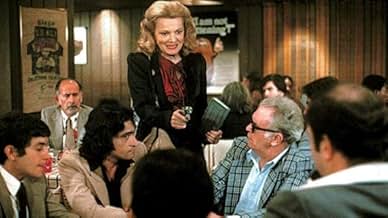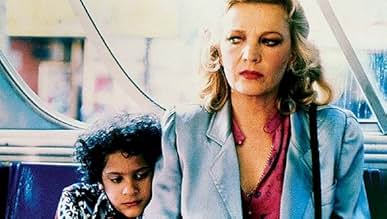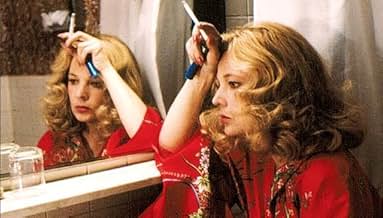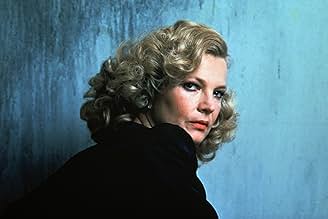PUNTUACIÓN EN IMDb
7,1/10
13 mil
TU PUNTUACIÓN
Cuando la mafia mata a la familia de un niño, su vecina Gloria se convierte en su guardiana. Ellos tienen en posesión un libro que los gánsteres quieren y se dan a la fuga en Nueva York.Cuando la mafia mata a la familia de un niño, su vecina Gloria se convierte en su guardiana. Ellos tienen en posesión un libro que los gánsteres quieren y se dan a la fuga en Nueva York.Cuando la mafia mata a la familia de un niño, su vecina Gloria se convierte en su guardiana. Ellos tienen en posesión un libro que los gánsteres quieren y se dan a la fuga en Nueva York.
- Nominado para 1 premio Óscar
- 4 premios y 5 nominaciones en total
Gary Howard Klar
- Irish Cop
- (as Gary Klar)
Reseñas destacadas
A genre-bending odyssey, full of dank, dark alleys, filthy side streets, buses, taxi cabs, trains and subways, John Cassavetes' film "Gloria" is perhaps the most impersonal of his personal work, which surely inspired Luc Besson's 1994 action-packed "Leon," the film explores the development of the mother-son bond under extreme circumstances.
One of Gena Rowland's most underrated performances, Gloria stands shoulder to shoulder with other iconic heroines of American cinema; such as Dietrich's Shanghai Lily and Uma Thurman's Beatrix Kiddo.
Cassavetes explores new narrative possibilities unlike any other of his contemporaries. Though there always seems to be a surplus of emotion, dialogue or trivialities in his work - and I'm not the first to make such an observation - Cassavetes maintains his focus, which is of course, to show us a slice of life, however extreme or crazy it may appear to an audience.
One of Gena Rowland's most underrated performances, Gloria stands shoulder to shoulder with other iconic heroines of American cinema; such as Dietrich's Shanghai Lily and Uma Thurman's Beatrix Kiddo.
Cassavetes explores new narrative possibilities unlike any other of his contemporaries. Though there always seems to be a surplus of emotion, dialogue or trivialities in his work - and I'm not the first to make such an observation - Cassavetes maintains his focus, which is of course, to show us a slice of life, however extreme or crazy it may appear to an audience.
I caught this on TV once and was blown away by its energy and spontaneity. Gena Rowlands is as good in it as everyone says, with some real surprises. The point about the kid coming out with "grown up" mock-heroic phrases at some points is that he's picked all that stuff up from the movies and listening to his parents' gangster friends. It's supposed to be funny - he keeps shouting "I'm the Man" when he patently isn't.
The movie takes action/gangster movie genre conventions by the scruff of the neck and shakes them till interesting stuff falls out. The editing and cinematography are great. New York looks gritty but beautiful.
True the film is kind of rough round the edges, I guess down to Cassavetes' improvisatory style, however it's a lot more accessible than most of his work and you should see it if you get the chance.
The movie takes action/gangster movie genre conventions by the scruff of the neck and shakes them till interesting stuff falls out. The editing and cinematography are great. New York looks gritty but beautiful.
True the film is kind of rough round the edges, I guess down to Cassavetes' improvisatory style, however it's a lot more accessible than most of his work and you should see it if you get the chance.
You start with flinty, streetsmart gangster types, cross their paths with a little kid, put them in urban peril, and then you squeeze how things stack up for sentimentality, suspense and humor. It's a charming idea, and perhaps that's why this could be considered John Cassavetes's most conventional film. It tells the story of a gangster's girlfriend who goes on the run with a young boy who is being pursued by the mob for information he doesn't even know he might have. But he wants to tell the story his own way, obstructing every convention we would normally expect, instilling a realist perspective in how we follow the movie, making the pay-off that much more worthwhile. Cassavetes didn't intend to direct his script. He just wanted to sell the story to Columbia Pictures. But once his wife Gena Rowlands was asked to play Gloria, she obliged Cassavetes to direct it.
This underdog crime drama is particularly absorbing in its first hour, and ignites with a great beginning. We follow one character, it leads to another character, perspectives are interknit, the situation builds and Cassavetes has complete control over what we know and expect, all in spite of the all-too-familiar premise, which is then set for the rest of the movie, which is a cat-and-mouse hunt per the seedier locales of New York and New Jersey. He makes the threat so real that when the two key characters evade tangible danger, we still feel the tension whenever they round a corner, get in and out of cabs, and other such ordinary actions. He doesn't let on that unwanted company is present. It just happens. There is one scene that lasts for quite awhile before we realize, after Rowlands's title character does, that unwanted company has been there the entire time.
In an Oscar-nominated performance, Rowlands is expectedly the beautiful lead actress, but she sports a kind of masculine quality, creating a much more dense dynamic when she, afraid of her maternal instincts, finds them overpowering her lifelong self-preservation, and begrudgingly protects the boy. As the film progresses, however, she becomes more sincere in her protection, and integrates her love with her seasoned familiarity with how to stay alive in this town. In one creative take on the Fine, I Don't Need You Anyway scene, she asks a bartender, "There's reasons I can't turn and just look, but is there a little kid headed in here or across the street or whatever?" She drives her role with such honest irritable liveliness. Yet the kid is also well cast. He was a conspicuous little boy named John Adames with dark hair, big eyes and a way of trucking his dialogue as if confronting you to adjust a single word. It all works because everything about his character, the way he dresses, talks, revolts and moves, serves the naive notion that he is older, smarter and cooler than he is.
Cassavetes has a natural keenness for guilelessly unadorned location shooting in that he never plans, stages, waits on the weather or time of day, or hires extras or stunt drivers. Note how passers-by in the distance will often look on at the characters, whether Gloria has pulled a gun in a public place or not. Wherever the characters need to be, that place is in real time, as dirty, scuzzy and purely of the film's era as it would've normally been. There's a shabby flophouse where the clerk tells Gloria, "Just pick a room. They're all open." There are bus stations, back alleys, dimly lit hallways, and bars that open at dawn. And his occasional action scenes are so thrilling because of their surprise.
For once, Cassavetes doesn't stage indefinitely extensive scenes of dialogue wherein the actors indulge in their own view of their characters' unraveling. But I miss that. As I've already said, I am very impressed with how tightly he mounts suspense from the very beginning, how Gloria and the kid zip from cab to bus to cab to street to hotel to cab and so on. But regardless of how doggedly realistic he is in his portrayal of a recycled movie plot, he still relies upon that plot rather than the impositions of his characters flexing their wings.
This underdog crime drama is particularly absorbing in its first hour, and ignites with a great beginning. We follow one character, it leads to another character, perspectives are interknit, the situation builds and Cassavetes has complete control over what we know and expect, all in spite of the all-too-familiar premise, which is then set for the rest of the movie, which is a cat-and-mouse hunt per the seedier locales of New York and New Jersey. He makes the threat so real that when the two key characters evade tangible danger, we still feel the tension whenever they round a corner, get in and out of cabs, and other such ordinary actions. He doesn't let on that unwanted company is present. It just happens. There is one scene that lasts for quite awhile before we realize, after Rowlands's title character does, that unwanted company has been there the entire time.
In an Oscar-nominated performance, Rowlands is expectedly the beautiful lead actress, but she sports a kind of masculine quality, creating a much more dense dynamic when she, afraid of her maternal instincts, finds them overpowering her lifelong self-preservation, and begrudgingly protects the boy. As the film progresses, however, she becomes more sincere in her protection, and integrates her love with her seasoned familiarity with how to stay alive in this town. In one creative take on the Fine, I Don't Need You Anyway scene, she asks a bartender, "There's reasons I can't turn and just look, but is there a little kid headed in here or across the street or whatever?" She drives her role with such honest irritable liveliness. Yet the kid is also well cast. He was a conspicuous little boy named John Adames with dark hair, big eyes and a way of trucking his dialogue as if confronting you to adjust a single word. It all works because everything about his character, the way he dresses, talks, revolts and moves, serves the naive notion that he is older, smarter and cooler than he is.
Cassavetes has a natural keenness for guilelessly unadorned location shooting in that he never plans, stages, waits on the weather or time of day, or hires extras or stunt drivers. Note how passers-by in the distance will often look on at the characters, whether Gloria has pulled a gun in a public place or not. Wherever the characters need to be, that place is in real time, as dirty, scuzzy and purely of the film's era as it would've normally been. There's a shabby flophouse where the clerk tells Gloria, "Just pick a room. They're all open." There are bus stations, back alleys, dimly lit hallways, and bars that open at dawn. And his occasional action scenes are so thrilling because of their surprise.
For once, Cassavetes doesn't stage indefinitely extensive scenes of dialogue wherein the actors indulge in their own view of their characters' unraveling. But I miss that. As I've already said, I am very impressed with how tightly he mounts suspense from the very beginning, how Gloria and the kid zip from cab to bus to cab to street to hotel to cab and so on. But regardless of how doggedly realistic he is in his portrayal of a recycled movie plot, he still relies upon that plot rather than the impositions of his characters flexing their wings.
Tastes may vary on this one, but there's much about this film that's endearing to viewers. It strikes you that the story isn't exactly the only of its kind (I see it as a precursor to -Leon- and probably takes cues from the delightful -Paper Moon-, but others of its "kind" are hard to think of), but it's about as well-done as you might expect. Some may not care for the Cassavetes stylistic touches, but here they are not especially intrusive. Gloria's a tough and likeable "bitch" with a moral compass, rightfully the center of the story. It outdoes -Leon- by not investing too much script capital in "developing" the child character. (It was primarily that aspect of -Leon- that annoyed me most.) This is straightforward, without the frills and gimmicks, emotional or otherwise. I do plan on watching the recent version with Sharon Stone, but don't expect to be as satisfied as with this.
I'd give it a minimum of 7/10 on my own, tough scale. I am surprised this is so little-known compared to -Leon-.
I'd give it a minimum of 7/10 on my own, tough scale. I am surprised this is so little-known compared to -Leon-.
There must be a million woman like Gloria. They never got educated but they're smart. They're good looking, but not enough to get that gangster boyfriend to leave his wife. They hostess or maybe they just are table dressing for as long as they can. They make enough to have a decent apartment, and they hock the gift jewelry and furs and stick the money in a safe deposit box for the day they just can't do it any more. Can't smile and nod and be sweet, and the goombas look to the younger girls for attention. They try to keep quiet and keep their nose clean and ignore the young punks that treat them a little worse every year.
But life can mess up your plans, as it does for Gloria when it dumps an orphaned kid in her lap and some of her p***ed gangster pals at her door. And the decision she makes to save the kid's life means she can never go back.
"Gloria" isn't really about stuff like violence or mobsters or guns at all. It's about the hopes and wishes and loneliness of a life that represents the lives of many invisible woman. Gloria has always been a "broad" as she says. Never the Madonna, to be worshipped and respected. Always the Whore to be stepped on. And it sucks to be at the mercy and whim of men. Especially cruel, stupid thugs who don't have the brains or guts to do anything but lie, cheat, steal, and kill women and children.
Gloria reluctantly gives up her old life. She gave years of her life to these slobs and she doesn't want to lose the little she got for her troubles. She just wants peace and quiet and to be left alone. Why give it up to help some annoying kid?
But when she makes the decision to do just that, her rage and resentment explode.
Gena Rowlands gives a flawless performance that burns bright and makes the viewer feel the rage of those who hide their intelligence and personality and try to "get by" in a world of lesser men. Gloria's got more balls and brains than any of the suits that run the racket. And now she's going to prove it.
"Gloria" is what happens when adults make movies for adults. No childish chatter, no idealized and airbrushed world, no moralizing and preaching. This movie has blood in its veins.
But life can mess up your plans, as it does for Gloria when it dumps an orphaned kid in her lap and some of her p***ed gangster pals at her door. And the decision she makes to save the kid's life means she can never go back.
"Gloria" isn't really about stuff like violence or mobsters or guns at all. It's about the hopes and wishes and loneliness of a life that represents the lives of many invisible woman. Gloria has always been a "broad" as she says. Never the Madonna, to be worshipped and respected. Always the Whore to be stepped on. And it sucks to be at the mercy and whim of men. Especially cruel, stupid thugs who don't have the brains or guts to do anything but lie, cheat, steal, and kill women and children.
Gloria reluctantly gives up her old life. She gave years of her life to these slobs and she doesn't want to lose the little she got for her troubles. She just wants peace and quiet and to be left alone. Why give it up to help some annoying kid?
But when she makes the decision to do just that, her rage and resentment explode.
Gena Rowlands gives a flawless performance that burns bright and makes the viewer feel the rage of those who hide their intelligence and personality and try to "get by" in a world of lesser men. Gloria's got more balls and brains than any of the suits that run the racket. And now she's going to prove it.
"Gloria" is what happens when adults make movies for adults. No childish chatter, no idealized and airbrushed world, no moralizing and preaching. This movie has blood in its veins.
¿Sabías que...?
- CuriosidadesActress Gena Rowlands once said of her ex-gun moll character: "When I read the script, I knew I wanted a walk for her. I wanted something that, from the minute you saw me, you knew I could handle myself on the streets of New York. So I started thinking about when I lived in New York, how different I walked down the street when there was nobody but me. It was a walk that said, they'd better watch out."
- PifiasWhen Phil boards the train, the shot has been reversed, as evidenced by backwards lettering on the signs on the train and the platform.
Selecciones populares
Inicia sesión para calificar y añadir a tu lista para recibir recomendaciones personalizadas
- How long is Gloria?Con tecnología de Alexa
Detalles
- Fecha de lanzamiento
- País de origen
- Sitios oficiales
- Idiomas
- Títulos en diferentes países
- Glòria
- Localizaciones del rodaje
- Trinity Church Cemetery - 770 Riverside Drive, Manhattan, Nueva York, Nueva York, Estados Unidos(ending scene at Pittsburgh cemetery)
- Empresa productora
- Ver más compañías en los créditos en IMDbPro
Taquilla
- Recaudación en Estados Unidos y Canadá
- 4.059.673 US$
- Fin de semana de estreno en EE. UU. y Canadá
- 33.767 US$
- 5 oct 1980
- Recaudación en todo el mundo
- 4.062.212 US$
Contribuir a esta página
Sugerir un cambio o añadir el contenido que falta





























